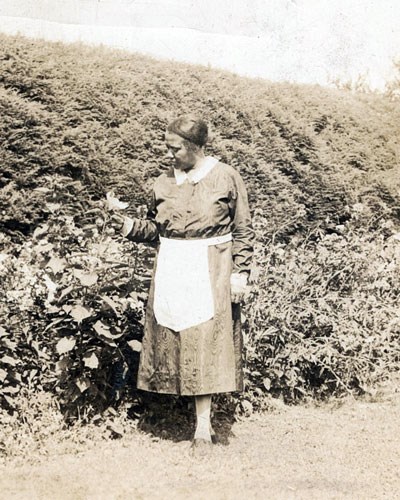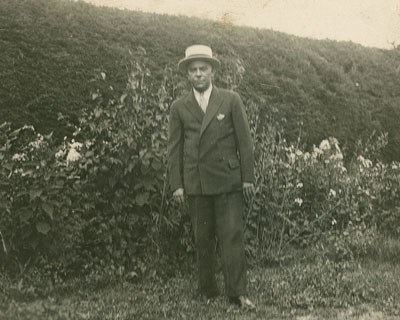“Next to his wife, I am around the President more than anyone else.”
Irvin McDuffie Elizabeth “Lizzie” Hall was born in 1881 to parents who had been born in slavery. When Lizzie was six, her father found a job on the grading crew at Atlanta’s Grant Park. Her mother worked as a cook. Lizzie attended school, first at the Summer Hill grammar school and then at the high school at Morris Brown College, where she excelled on stage. After dropping out of Morris Brown for financial reasons, she worked as a children’s nurse. In 1906, Lizzie lived through the brutal Atlanta Race Riot. She “watched the march from South Atlanta” as “Negro families streamed by . . . loaded down with their pitiful bundles of household treasures and clothing. . . . innocent men, women, and children, hunted and fearful for their lives.” It was “perhaps because I remembered that fearful march of my people,” she wrote, that “my job at the White House became a little more than a job. It also became a small crusade.” 
Elizabeth McDuffie in the Roosevelt garden at Hyde Park. Elizabeth and Irvin McDuffie Papers, Atlanta University Center, Robert W. Woodruff Library. Her invaluable memoir, published in part in Ebony in 1952, included joyful memories, too. “I attended a small party where I met a barber named Irvin McDuffie.” They kept an eye on each other all night. At the end of the evening, McDuffie approached her and said with great formality, “Miss Hall, I have been favorably impressed with you. I would like to call.” They married not long after. Irvin “Mac” McDuffie was born in 1882, in Elberton, Georgia. He attended school through eighth grade. In 1900 he moved to Atlanta, where he learned to be a barber. Mac rose through the ranks to become the manager of the McDuffie Herndon barbershop, which was bankrolled by the African American barber-turned-businessman Alonzo Herndon of the Atlanta Life Insurance Company. Mac had a reputation for good conversation at the barbershop, and he learned through a customer that the Democratic Party’s 1920 candidate for vice president, Franklin Roosevelt, was looking for a valet at his home in Warm Springs, Georgia. “After ten minutes of conversation,” Mac recalled of his first meeting with FDR, “we closed the deal.” Mac accompanied FDR back to New York; Lizzie stayed in Atlanta until joining her husband at the White House in 1933. Fully confident in an FDR victory, she had already planned to move to the city to get a job in the White House or elsewhere and was delighted when Eleanor Roosevelt offered her a position as maid. 
FDR's valet, Irvin McDuffie, in the Roosevelt garden at Hyde Park. Elizabeth and Irvin McDuffie Papers, Atlanta University Center, Robert W. Woodruff Library. The McDuffies had a uniquely close, personal relationship with the president. Mac was responsible for the everyday needs of a man paralyzed from polio. He woke FDR in the morning, put on his metal braces, and helped him into his wheelchair. “After eating his breakfast,” Mac said, “the President reads the morning papers, including the leading Negro weeklies. He does lots of work before he gets up. He can work five men to death while he lies in bed.” Mac cleaned the president’s clothes and shoes, cut his hair (although FDR did his own shaving), and took the braces off before helping the president into bed at night. He also looked after FDR’s health. “He spent twelve years trying to get Mr. Roosevelt to bundle up against the cold,” Lizzie wrote, “and never gave up trying to stop his taking a hot bath in the morning and then going straight out into the winter air.” This relationship made the McDuffies unofficial liaisons between the White House and the Black press. Remarkable profiles of the McDuffies by the journalist Frederick Weaver in the Baltimore Afro-American in July 1933 demonstrated how intimately they connected with the president, as well as how the Black press focused on White House domestic staffers. “Next to his wife,” Mac said, “I am around the President more than anyone else. I am the first he sees in the morning and the last at night.” Mac was with FDR while he tried out a new car. “The car is a specially built one for the President with everything needed for the operation on the steering wheel.” When FDR arrived back at the White House, “The President came through in a wheel chair (as he had off his braces).” On the president’s views towards Black issues, Mac said: “I can frankly say that the President does not think in terms of races but in terms of Americans, and he believes the Negro is an American. I heard every speech he made during his campaign, and never did he single out the colored people. . . . I think of him not as a boss but as a friend. One thing I can truthfully say, I have worked for one good, great man.” Lizzie McDuffie’s rapport with the president went beyond her staff position and surprised many of the White House employees. FDR called her “doll” and permitted no one else to clean his room. Like her husband, she took the opportunity to praise the Roosevelts, saying that Eleanor Roosevelt “is loved by all who know her.” She later wrote that FDR was “a true friend of the Negro race without paternalism. I felt that I was ‘Lizzie McDuffie’ to the President, not an automaton in a black moiré or white uniform saying, ‘Yes, sir.’” In 1934 the New York Amsterdam News wrote that the McDuffies were a “helpful influence in many directions where the welfare of the Negro is concerned.” Indeed, Lizzie McDuffie took advantage of her close relationship to the president, “to put in a good word for some of the artists in my own race.” She claimed credit for suggesting Marian Anderson perform for ER, as well as for bringing the Morehouse Quartet, which had performed previously in Warm Springs, to the White House. She met dozens of foreign dignitaries. There was a screened alcove on the second floor where we could see and not be seen, and we were packed in there when he walked by.” Lizzie branched out into politics as part of her “small crusade.” FDR laughed when she told him that she intended to serve as his “SASOCPA, self-appointed-secretary-on-colored-people’s-affairs.” She kept FDR up to date on issues important to African Americans, such as the Scottsboro Boys case, and claimed to have been “able to interest” the president in the case of three Black veterans who had allegedly fought police in Houston in 1917. FDR pardoned the men. She also worked behind the scenes to bring FDR’s attention to the iniquities of the New Deal. After all, domestic workers such as herself and thousands of other African Americans did not qualify for Social Security benefits. In 1936 she even hit the road to stump for FDR, speaking in midwestern cities. She usually had to stay with fellow Black Democrats, since she was not welcome at the segregated local hotels. Scholar Mary-Elizabeth Murphy writes: “McDuffie had to influence Black voters to embrace a political party long associated with Jim Crow policies, including segregation and disfranchisement.” Lizzie’s speeches, and the victory of the Democrats the following month, made her an in-demand speaker moving forward and, in 1940 the Baltimore Afro-American named her one of the eight women of the year. Lizzie expanded her role after FDR’s reelection when she became treasurer of the United Government Employees Incorporated (UGE), where she promoted Black economic citizenship, calling, for example, for a minimum wage of $1,500 for all federal employees, including maids such as herself. She also amplified causes that were important to her, such as when she and UGE president Edgar Brown testified before the Senate in defense of Virginia laundresses who were paid a pittance, only $600 per year, for their work cleaning the clothes of US military members. Lizzie continued her important work with the UGE in 1938 and 1939, but all was not well in Washington. In 1939, her husband left the White House before FDR announced he was running for a third term. Mac himself said that he suffered a nervous breakdown, but emphasized that he remained friends with the president and supported him politically. He took a new job with the Treasury Department, and Lizzie continued working at the White House even though she no longer lived there. In a testament to their close relationship, FDR kept tabs on Mac for the rest of his life. In 1944 Lizzie wrote to Grace Tully saying that “the sun would cease to shine” for her husband if FDR forgot his birthday. Lizzie was at Warm Springs with the president when he died on April 12, 1945. One of the last things he said to her, she recalled, was “tell McDuffie I didn’t forget his birthday. I was at Yalta, you know.” She rode the funeral train to Washington. Mac called FDR’s death “the greatest shock I ever had. It was as though part of me had died.” Mac himself died the following year. Lizzie returned to Atlanta. She was no longer directly involved in politics, but her name continued to loom large in the Black press thanks to her pivotal role in the Roosevelt administration. _______________________
Explore the original report, The Roosevelts & African American Civil Rights Leaders, which features in-depth stories and additional leaders. DOWNLOAD THE REPORT |
Last updated: January 15, 2024
